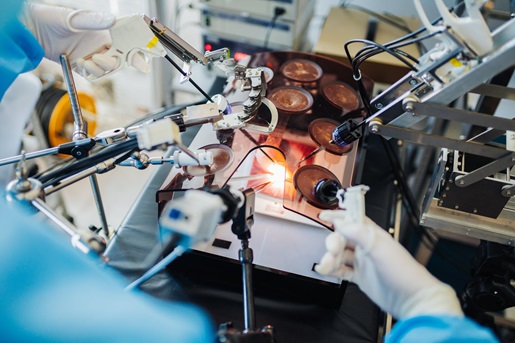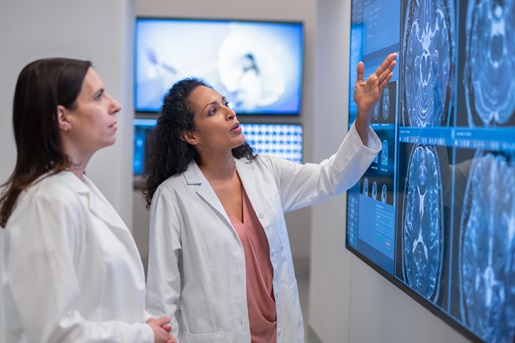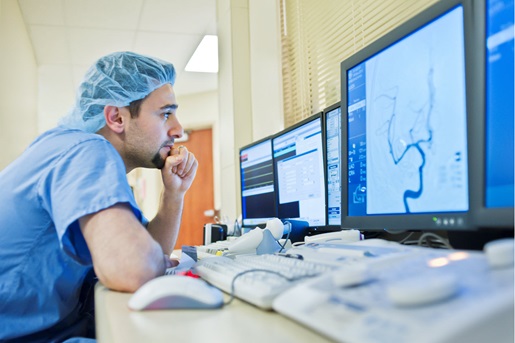The use of AI in healthcare includes diagnosing patients, creating effective treatment plans, discovering new drugs, and even combating medical fraud
How is AI used in healthcare? It can help diagnose patients; it can analyze complicated medical images; and it can even automate tedious office tasks. While the medical profession has employed AI for decades, powerful PCs and cloud computing have made the technology more accessible than ever before. If your office isn't already using AI in some capacity — and it probably is — then it likely will soon.
Since the technology is so broad, there's no way to make a comprehensive list of AI uses in healthcare. Instead, we'll discuss 10 potential applications, ranging from patient treatment to pharmaceutical research.
Need help picking the right scanner for your transition to AI-powered healthcare? Check out our post, AI in Healthcare: The Complete Guide.
How is AI used in healthcare?
How can AI be used in healthcare? To understand this technology's role in medicine, it's helpful to consider AI's history in the field.
The use of AI in healthcare dates back to 1971, with the invention of INTERNIST-1, which could parse massive amounts of patient data, and produce a list of possible diagnoses.
Essentially, any problem that requires sifting through massive amounts of data and determining probable outcomes can benefit from AI.
Did You Know?: The RICOH fi-8170 is a 2023 Future of Work Product of the Year Award winner, recognized as one of the “most innovative and disruptive products and solutions that have positively supported hybrid work experiences across the globe.” Learn more here.
AI's role in improving patient outcomes
The question of "how is AI being used in healthcare" is most relevant when considering patient outcomes. Between more accurate diagnoses and better treatment plans, AI can be deployed to assist with a wide range of challenges the healthcare industry faces – below are a few such examples.
Assisted diagnosis
AI algorithms can analyze a patient's vital signs, medical history, imaging tests, and lab results, just like a clinician. However, that algorithm could tease out correlations and draw probable conclusions much faster than a human — particularly if it's working through multiple patient records.
Prescription auditing
Prescription auditing evaluates how well a patient's current treatment regimen is working. Since recovering patients often need to take prescription drugs, the potential for incorrect dosage, negative drug-drug interactions, and pharmaceutical misuse is always present. Machine learning can study how various drugs interact with each other, and help draw connections that might not be obvious to a human observer.
Treatment plan creation
Every patient requires a different treatment plan. This is particularly true when it comes to complex diseases with invasive treatments, such as cancer. By comparing a patient's records and images with those in an existing database, an AI algorithm can create the broad strokes of a treatment plan in less time than it would take a human.
Patient data analytics
While each patient is unique, each patient is also part of a larger community. By using patient data analytics, AI algorithms can draw conclusions based on whole populations. Whether linked by region, demographics, or a specific medical condition, analyzing large groups of people can lead to novel discoveries.
Medical imaging analysis
If you needed a single answer for "how is AI used in healthcare," then "medical imaging analysis" would be a strong frontrunner. Computers are much better at discovering inconsistencies in images than the human eye. As such, AI is an invaluable tool in radiology, where it can detect tumors before humans can.
Genome sequencing
Genome sequencing is a field that requires both sophisticated AI algorithms and raw computing power. Genomics research is on track to generate up to 40 exabytes (40,000,000 terabytes) of data over the next few years. AI programs can analyze that information and use it to discover specific genetic sequences that cause diseases.
Drug discovery
The scientific journal Artificial Intelligence Review has identified no fewer than 11 distinct ways that machine learning can aid drug discovery. As a simple example, AI programs can collate data from dozens of medical studies and draw novel conclusions.
Did You Know?:The fi-8170 can scan up to 70 pages per minute and 10,000 pages per day. Click here to learn more.
Making medical offices more efficient with AI
Using AI in healthcare can also benefit medical professionals in office settings. AI can automate a lot of clerical busywork, which lets employees focus on more interesting and demanding tasks. It also means that clinicians can spend more time with patients and less time with paperwork.
Front-office automation
In medical offices, AI can help with everything from intake to record-keeping. For example, an AI chatbot could collect clerical information and upload it to a database before a patient's first appointment.
Employees could also gather patient documents in-person, then scan them with a device such as the RICOH fi-8170. Using AI technology, the device's PaperStream Capture technology can automatically enhance, name, and index files.
Back-office reporting
AI is particularly well-suited to back-office reporting. Companies are already using AI to manage medical insurance claims, as well as to bill patients and manage prescriptions.
Fraud detection
Medical fraud eats up billions of dollars every year, but it's notoriously hard to combat. AI algorithms can analyze fraudulent Medicare and Medicaid reports, and discover subtle patterns that humans would find hard to recognize. In the future, more sophisticated AI detection could help drive down costs and hold scammers accountable.
Our recommendation: RICOH fi-8170
If "how is AI used in healthcare" is under consideration in your office, then digitizing your documents is a smart place to start. We take great pride in having spent the last 50+ years researching, designing, and developing some of the most advanced and powerful electronics in the world, including our professional grade fi and SP series of scanners.
Built to purpose for the most demanding document handling jobs, fi and SP scanners are capable of processing tens of thousands of pages per day at the highest levels of accuracy. Their intuitive integration capabilities with all existing work suites minimize time-to-value for businesses looking to invest in tools that will pay dividends for years to come.
The RICOH fi-8710 scanner is an excellent choice for small-to-mid-size medical offices. This compact device can scan up to 70 pages per minute. There's also a manual mode for heavier documents, such as driver's licenses and insurance cards. The included PaperStream software can accurately parse text and images, while both USB and Ethernet connections ensure compatibility with a wide variety of devices. Click here to learn more or shop the rest of our production scanner line.
Note: Information and external links are provided for your convenience and for educational purposes only, and shall not be construed, or relied upon, as legal or financial advice. PFU America, Inc. makes no representations about the contents, features, or specifications on such third-party sites, software, and/or offerings (collectively “Third-Party Offerings”) and shall not be responsible for any loss or damage that may arise from your use of such Third-Party Offerings. Please consult with a licensed professional regarding your specific situation as regulations may be subject to change.









